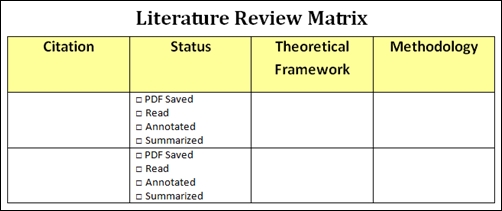Subject Guides
- Binghamton University Libraries
- Subject Guides
- Course Pages
- HDEV 305: Child Development
- Conducting a Literature Review
HDEV 305: Child Development: Conducting a Literature Review
Guide Contents
Getting Started
So what is the purpose of a literature review?
A literature review should provide a broad, evaluative overview of themes within the existing literature related to the particular issue that you have chosen. A literature review helps to:
- Demonstrates an understanding of the pre-existing research
- Provides context for your research
- Helps build a case for why new research is necessary, to fill in the research gaps
- Provides a web of major works and secondary works that continue to build upon one another.
A literature review should not summarize all the collected literature (that is the purpose of an annotated bibliography); it's important to find common threads throughout the literature and synthesize this information.
Education & Gender Review Topics found in the Annual Reviews database
Gender Inequality and Higher Education
This paper reviews a diverse literature on gender and higher education. Gender inequality is more pronounced in some aspects of the educational systems than in others. The analysis distinguishes 1) access to higher education; 2) college experiences; and 3) postcollegiate outcomes. Women fare relatively well in the area of access, less well in terms of the college experience, and are particularly disadvantaged with respect to the outcomes of schooling. Explanations of gender inequality in higher education should distinguish between these different aspects of education and should explain those contexts in which women have attained parity as well as those in which they continue to lag behind men.
Gender Inequalities in Education
The terrain of gender inequalities in education has seen much change in recent decades. This article reviews the empirical research and theoretical perspectives on gender inequalities in educational performance and attainment from early childhood to young adulthood. Much of the literature on children and adolescents attends to performance differences between girls and boys. Of course, achievement in elementary and secondary school is linked to the level of education one ultimately attains including high school completion, enrollment in postsecondary education, college completion, and graduate and professional school experiences. We recommend three directions for future research: (a) interdisciplinary efforts to understand gender differences in cognitive development and noncognitive abilities in early childhood, (b) research on the structure and practices of schooling, and (c) analyses of how gender differences might amplify other kinds of inequalities, such as racial, ethnic, class, or nativity inequalities.
The Early Education of Socioeconomically Disadvantaged Children
This chapter reviews selected research on the education of lowsocioeconomic status (SES) children from birth through the first years of elementary school. Themes include the importance of early academic skills and interest to later achievement; the benefits of integrating knowledge from research on mental health and other areas; the need to utilize and build children's strengths as well as address their weaknesses; and a call to connect research to practice and policy. Relevant research on race and culture is reviewed because ethnic minority low-SES children are at great risk of poverty. Gender is discussed because low-SES boys have poorer general achievement than girls, while very few low-SES girls pursue careers in math- and science-related fields.
Locating Literature Reviews
Literature reviews can be found in most article databases. Search for the phrase "literature review"
Or use the database Annual Reviews to search through an index of literature reviews.
-
Annual ReviewsThese summarize the current state of research on a subject by organizing, synthesizing, and critically evaluating the relevant literature.
Synthesis Matrix Examples

Table from Union Library, Union Institute and University
Select reliable resources

Locating Broad Topic Overviews
-
Gale Virtual Reference Library
Thousands of encyclopedias, almanacs, and specialized reference sources that can be cross-searched.
-
CQ ResearcherA weekly publication providing original in-depth analysis of the most current major and controversial issues of the day. Coverage: 1991 - present.
-
Opposing Viewpoints
Includes viewpoint articles, topic overviews, statistics, primary documents, links to websites, and full-text magazine and newspaper articles.
-
-
Wiley-Blackwell Handbook of Childhood Cognitive Development by
Publication Date: 2010
Literature Review Tutorials
Helpful Books
-
Writing Literature Reviews by
Call Number: Bartle Library Stacks (H61.8 .G3 2004 )ISBN: 1884585663Publication Date: 2006-01-01 -
Literature Review by
Call Number: LB2369 .R525 2008ISBN: 9781412934251Publication Date: 2008-03-03 -
Systematic Approaches to a Successful Literature Review by
Call Number: Bartle Library Stacks -- LB1047.3 .B6 2012 -- REGULAR LOANISBN: 9780857021359Publication Date: 2012-01-24
Helpful Websites
-
Guidelines for Writing a Literature ReviewCoordinated by Helen Mongan-Rallis of the Education Department at the University of Minnesota Duluth
-
Literature Review: a few tips on conducting itCreated by the University of Toronto Writing Center